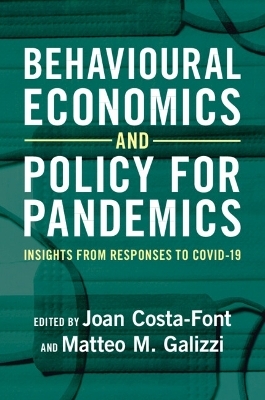
Behavioural Economics and Policy for Pandemics
Cambridge University Press (Verlag)
978-1-009-43846-9 (ISBN)
Behavioural economics and behavioural public policy have been fundamental parts of governmental responses to the Covid-19 pandemic. This was not only the case at the beginning of the pandemic as governments pondered how to get people to follow restrictions, but also during delivery of the vaccination programme. Behavioural Economics and Policy for Pandemics brings together a world-class line-up of experts to examine the successes and failures of behavioural economics and policy in relation to the Covid-19 pandemic. It documents how people changed their behaviours and use of health care and discusses what we can learn in terms of addressing future pandemics. Featuring high-profile behavioural economists such as George Loewenstein, this book uniquely uncovers behavioural regularities that emerge in the different waves of COVID-19 and documents how pandemics change our lives.
Dr Joan Costa-Font is a Professor of Health Economics at the London School of Economics and Political Science (LSE) where he leads the Ageing and Health Incentives Lab (AHIL). He is the Director of the MSc International Health Policy, and the bulk of his teaching is on behavioural health economics. He has been Harkness Fellow at Harvard University, policy evaluation scholar at Sciences Po and has held visiting research positions at Oxford University, Boston College and UCL. Dr Matteo M. Galizzi is Associate Professor of Behavioural Science at the London School of Economics and Political Science (LSE). He is Co-Director of the LSE Behavioural Lab, and Director of the LSE Executive MSc in Behavioural Science. He is a behavioural and experimental economist working on randomised controlled trials and behavioural experiments in health and public policy.
1. Behavioural economics and policy for pandemics: pandemics as tipping points Joan Costa-Font and Matteo M. Galizzi; Part I. Evidence from Experiments and Behavioural Insights: 2. What have we learnt from behavioural economics for the COVID-19 response? Matteo M. Galizzi, Veronika Luptakova, Mario Macis and Sorin Thode; 3. Adaptation, COVID-19, and climate change George Loewenstein and Archie Kinnane; 4. Risk-taking, risk perception and risk compensation in times of COVID-19 Benno Guenther, Virginia Fedrigo and Jet Sanders; 5. A false sense of security? Face masking and social distancing Nicola Cerutti; 6. Preparing for the next pandemic: the role of behavioural economics in advanced care planning Juliet Hodges; 7. Human challenge trials for research on COVID-19 and beyond: the case of 1Day Sooner Jupiter Adams-Phipps, Steffen Kamenicek and Virginia Schmit; 8. Do the public support 'hard' or 'soft' public policies? Trends during COVID-19 and implications for the future Sanchayan Banerjee, Manu Savani and Ganga Shreedhar; 9. One size does not fit all: behavioural intervention to promote vaccination Ilana Brody, Silvia Saccardo and Hengchen Dai; 10. Psychological and behavioural aspects of the COVID-19 pandemic: systematic evidence and takeaways Ploutarchos Kourtidis, Henrike Sternberg, Janina Steinert, Tim Buthe, Giuseppe A. Veltri, Barbara Fasolo and Matteo M. Galizzi; 11. Behavioural science and the Irish COVID-19 response Liam Delaney and Emma Watson; 12. On the use of behavioural science in a pandemic Adam Oliver; 13. Behavioural public health? Experts' biases and responses to pandemics Matteo M. Galizzi; Part II. Health Behaviours and Policies During COVID-19: 14. The effect of COVID-19 on health and health behaviors: evidence from Spain Lydia Prieto and Judit Vall Castelló; 15. Mental health and health behaviours among vulnerable populations during the COVID-19 pandemic in the USA Daniel Banko-Ferran, Rania Gihleb and Osea Giuntella; 16. Mental health interventions during the COVID-19 pandemic: 'the welcomed lockdown' Joan Costa-Font and Cristina Vilaplana-Prieto; 17. Wrinkles in a pandemic? COVID-19 and behaviours towards older age individuals Joan Costa-Font; 18. Can behavioural insights explain ethnic minority vaccination gaps? Daniele Sudsataya, Miqdad Asaria, Joan Costa-Font and Faical Achaiki; 19. How can we optimise healthcare delivery in the wake of the COVID-19 pandemic? The rise of digital health solutions in England Georgina Connolly and Divya Srivastava; 20. Biases in vaccine authorization: erring on the side of rare events in SARS-CoV-2 vaccines Joan Costa-Font, Miqdad Asaria and Elias Mossialos; 21. Trust and the COVID-19 pandemic Caroline Rudisill and Sayward Harrison; 22. How do individuals perceive the risk of COVID-19 compared to food poisoning and influenza? Natasha Adulaimi, Joan Costa-Font and Luca Salmasi.
| Erscheinungsdatum | 20.04.2024 |
|---|---|
| Zusatzinfo | Worked examples or Exercises |
| Verlagsort | Cambridge |
| Sprache | englisch |
| Themenwelt | Studium ► Querschnittsbereiche ► Epidemiologie / Med. Biometrie |
| Wirtschaft ► Volkswirtschaftslehre ► Mikroökonomie | |
| Wirtschaft ► Volkswirtschaftslehre ► Wirtschaftspolitik | |
| ISBN-10 | 1-009-43846-8 / 1009438468 |
| ISBN-13 | 978-1-009-43846-9 / 9781009438469 |
| Zustand | Neuware |
| Haben Sie eine Frage zum Produkt? |
aus dem Bereich


